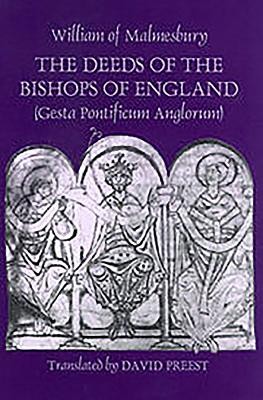![The Deeds of the Bishops of England [Gesta Pontificum Anglorum] by William of Malmesbury](https://thumb-eu.knygos-static.lt/37WduXtP6ebAdisyRHr_XtVWYbU=/fit-in/0x60/images/books/4518566/9780851158846.jpg)
- We will send in 10–14 business days.
- Author: William Of Malmesbury
- Publisher: Boydell Press
- ISBN-10: 0851158846
- ISBN-13: 9780851158846
- Format: 15.8 x 23.4 x 2.6 cm, softcover
- Language: English
- SAVE -10% with code: EXTRA
The Deeds of the Bishops of England [Gesta Pontificum Anglorum] by William of Malmesbury (e-book) (used book) | bookbook.eu
Reviews
Description
First modern English translation of important source for English church history from Augustine's arrival in Canterbury in 597 down to the 1120s.
William was born c.1095 not far from Malmesbury in Wiltshire; he entered the monastery at Malmesbury as a boy, and stayed there as a monk for the rest of his life, writing works which were to win him lasting fame as a historian. His Deeds of the Bishops of England chronicles the activities of the bishops in all the dioceses of England from Augustine's arrival in Canterbury in 597 down to the 1120s when the work was being written; in addition to bishops and cathedrals, William also includes saints who were not bishops, and religious houses other than cathedrals. For the period after Bede's death in 730, it is the most important single source for English church history, and indeed, together with William's other great achievement, the Deeds of the Kings of England, for the history of England.Much of the material William retells in his own style, and with considerable narrative skill, from earlier sources available to him in the monastic library. But he also travelled widely in England, and the organisation of the Deeds reflects a clear chronological and topographical order, from Canterbury and Rochester to London, East Anglia and Wessex, north to York, Lindisfarne and Durham, thence to Mercia, and finally, "returning home after a long journey", to his own abbey of Malmesbury and St Aldhelm.
EXTRA 10 % discount with code: EXTRA
The promotion ends in 20d.23:26:10
The discount code is valid when purchasing from 10 €. Discounts do not stack.
- Author: William Of Malmesbury
- Publisher: Boydell Press
- ISBN-10: 0851158846
- ISBN-13: 9780851158846
- Format: 15.8 x 23.4 x 2.6 cm, softcover
- Language: English English
First modern English translation of important source for English church history from Augustine's arrival in Canterbury in 597 down to the 1120s.
William was born c.1095 not far from Malmesbury in Wiltshire; he entered the monastery at Malmesbury as a boy, and stayed there as a monk for the rest of his life, writing works which were to win him lasting fame as a historian. His Deeds of the Bishops of England chronicles the activities of the bishops in all the dioceses of England from Augustine's arrival in Canterbury in 597 down to the 1120s when the work was being written; in addition to bishops and cathedrals, William also includes saints who were not bishops, and religious houses other than cathedrals. For the period after Bede's death in 730, it is the most important single source for English church history, and indeed, together with William's other great achievement, the Deeds of the Kings of England, for the history of England.Much of the material William retells in his own style, and with considerable narrative skill, from earlier sources available to him in the monastic library. But he also travelled widely in England, and the organisation of the Deeds reflects a clear chronological and topographical order, from Canterbury and Rochester to London, East Anglia and Wessex, north to York, Lindisfarne and Durham, thence to Mercia, and finally, "returning home after a long journey", to his own abbey of Malmesbury and St Aldhelm.


Reviews